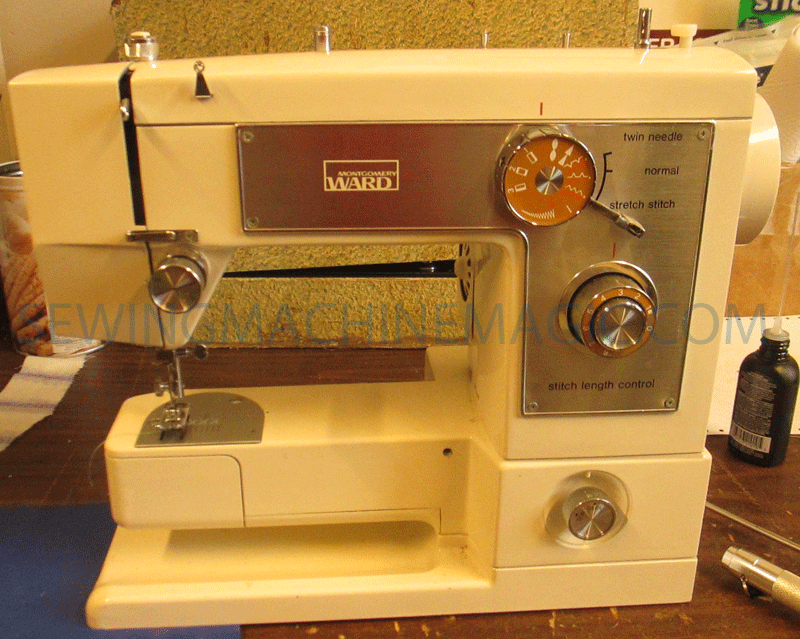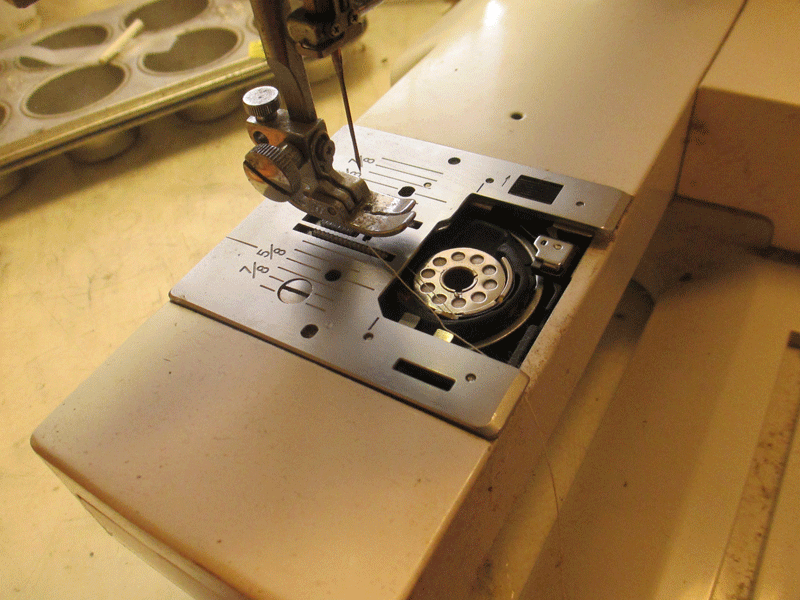I burned up almost the last of the shop fire wood today. Betsy came over and we each worked on a machine. She had a Kenmore (darn, she always gets the Kenmores!) and I pulled out a Montgomery Ward Free arm I have been itching to service for years. Yes, years. I bought this machine in 2012 at the same time that I bought a Singer 301 Long bed. I remember the day. Steven and I drove to Albany to fetch the 301. The seller brought out the Montgomery Ward too. I looked at it, saw that it was a free arm and brought it home.
Since then I have been wanting to get it on the bench. Instead I kept moving it around the shop. Someone built a very nice, custom, plywood case for it. The case weighs almost as much as the machine.
The machine is all metal, save the hand wheel and some of the knobs. The camstack is metal. It was kind of gummed up but a little bit of Tri Flow got it going.
The shuttle gears look miniature to me. At least compared to Kenmores
The extension table is solid and metal. It fits into the bed of the machine in three places. I think it is more secure that the extension tables on the Taiwanese made Kenmores of the late 70s.
Oh Boy. I love this machine. Twin Needle capability. Four stretch stitches, two decorative stitches, straight stitch and zig zag. You could even put the needle in left position if wanted. PLUS a very nice, functional built in button hole stitch. All of the stitches work beautifully. Comes with some attachments and the manual. Sweet Machine. I wonder who made Montgomery Ward machines? Janome?
UPDATE. 4/6/14
Betsy found this information on another blog. http://www.doubleveil.net/zssmp/wards.htm.
Yesterday I picked up the Kenmore to service for a customer. Actually I picked up two machines. The Kenmore and a Montgomery Ward Straight Stitch HA-1 Class 15. Unfortunately the wiring on the 15 is a MESS and I put it aside until we could talk to the owner. It is definitely worth fixing. It is a lovely machine.
The Kenmore is a 385. It isn't a clamshell but it isn't metal, either. It was pretty dirty, gummed up and reverse didn't work.
It is a class 15 machine too; a drop in bobbin. The bobbin case was loose in the race when Betsy opened up the machine. I have no idea how she got it working, but she managed to free up the reverse mechanism and we put it through every stitch. It sews pretty nicely, we have to admit. We figure the more experience we get with these kinds of machines, the better off we are. These machines will probably show up in our shop. We'd best know how to fix 'em.
Just the same I would hate to have to take this mechanism apart. This is the base of the free arm.
I don't really like the way the stitch selector works on this machine. It feels chintzy to me. But I must admit that the recommendations for stitch length, width and presser foot type are useful.
I admit that it made a decent stitch. For people who want a lot of bells and whistles, it is likely an ok machine, for the time being. Not for the long haul. Even my latest love, Ward, likely won't still be stitching in 2084. I betcha the 1938 Singer 201 will be. If the motor lasts that long. I don't see why it wouldn't.











Really, you are some kind of sewing-machine tart, falling in love with the next one down the pike, practically every other week. Shame on you.
ReplyDelete: 0
I know. You are right. But I am willing to list the Viking and the White.
DeleteWhat if I took this to Max's and Anna's so that I could have a machine there when I went to visit?
DeleteHope the customer wants the Montgomery Ward Straight Stitch HA-1 Class 15 rewired. And that we'll get to see the procedure. If so, would that also be a machine that will last a lifetime?
ReplyDeleteIt is more efficient to just replace the whole electrical system. The only re-wiring job that makes sense is for the potted motors since they are no longer available.
DeleteDo you mean that when you find broken wires, you replace the light and motor when there is nothing wrong with them, or were they shot too? Some of my machines have compatible colored light/motor and I'd like to save the match.
DeleteI mean that it is more efficient, when working on a customer's machine, to replace the electrical rather than re-wire it. I am not a professional electrician, just a hobbyist. I don't really feel comfortable re-wiring a machine that I am servicing. It takes about 5 minutes to replace the electrical components.
DeleteI love my 201 beautiful machines..I enjoy your blog I am learning a lot and wanted to thank you for taking the time to share. Sheryl
ReplyDeleteI recently picked up a 385 identical to yours. I agree, the stitch selector feels clunky, but it seems to do the job. For reverse, these 385s (I have 3 now) have a plastic cam/sleeve type thing that slides on a shaft when the reverse button is pressed. If the plastic piece has been oiled in the past and the oil dries out, reverse won't work or will be sluggish. It's just a matter of getting the old oil cleaned up. The stitch selector works on a similar principle, a guide slides on a shaft, and if things are gummed up, you won't be able to select some of the stitch patterns. Our first machine after getting married 28 years ago was a used 385, and it had both issues after sitting unused for years. I really like these 385s.
ReplyDeleteI really like the Montgomery Ward and the paint appears to be in great condition. If I find one of these, I'll know it's worth buying. Thanks for posting.
ReplyDeleteI love my Singer 201, only problem is getting enough time to do some sewing!!
ReplyDelete